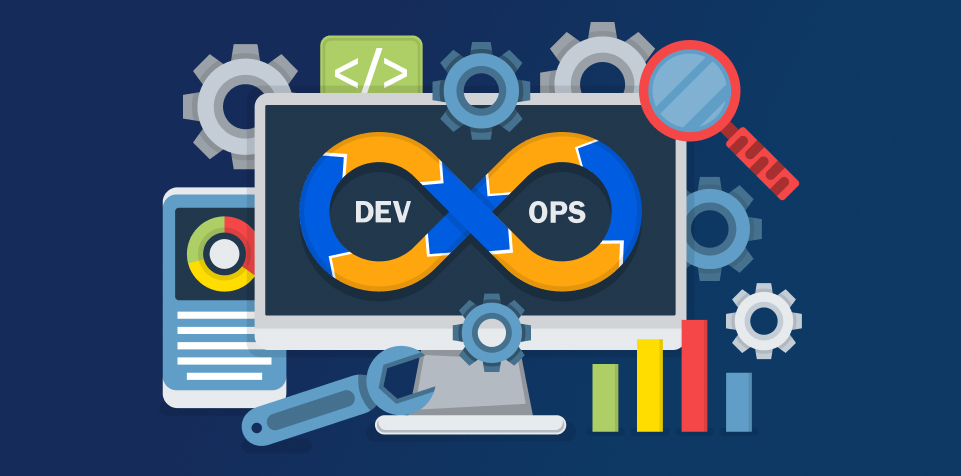Top 8 Skills Required in DevOps Engineer for 2024
February 13, 2024

Table of Contents
Building a successful career in DevOps is the most coveted dream for any developer nowadays. Most developers today want to get away with the stereotypical role of software developer and pick something thrilling and challenging. However, before diving in for a DevOps engineer role, you must thoroughly understand what it takes to become an efficient and remarkable performer. Don’t get fascinated by just fanciful terminologies and their roles. You need to get to the roots and in-depth knowledge of the practicalities involved in different situations.
For that, you must have the right set of skills that can show you are a promising DevOps engineer who can be relied upon and can conduct expeditious software delivery, reducing time-to-market and guaranteeing end-user satisfaction. In the blog, we take you through the entire range of skills that every small and large company like Amazon and Netflix seeks in a DevOps Engineer role. Before that, let us glance at what is DevOps and who are DevOps Engineers.
What is DevOps?

DevOps is a work culture driven by a methodology, aiming to automate and integrate software development and IT operations by implementing best practices and tools. It is a combination of two concepts ‘development’ and ‘operations’, unfolding various unconventional software development techniques to enhance quick delivery of services and applications. With DevOps, the team can evolve and innovate, identify and fix bugs rapidly, and promote reliability and scalability through effective collaborations.
Who is a DevOps Engineer?

DevOps Engineer is a certified professional who masters the skill of integration of development and operations, streamlining the development process without compromising on quality standards. DevOps Engineers can easily adapt to both kinds of environments and are highly efficient in harnessing various DevOps tools and practices to accelerate the speed of the software development process.
It takes the below set of skills to work as a successful DevOps Engineer in 2024.
Top 8 Skills Required in a DevOps Engineer in 2024
An efficient DevOps Engineer manages application development and delivery processes with precision and safety. They control, coordinate, and monitor software changes. All this is possible only when they master the below set of skills.
Technical Skills
The most important skills that any DevOps Engineer will need in 2024 are knowledge and practice of core technical skills. They need a sharp understanding of:
Automation Skills
Understanding the process of automation is the fundamental knowledge any DevOps Engineer should have. They need to master this skill effectively and must be able to automate every step of the pipeline. It includes infrastructure, configuration, CI/CD cycles, and monitoring of the app performance. Moreover, they must know DevOps tools, scripting, and coding because all these elements are deeply related to automation skills.
Linux Coding and Scripting Skills
DevOps Engineers must have in-depth knowledge of Linux to manage and set up servers. Also, they must know coding and scripting for task automation.
Cloud Skills
Cloud and DevOps will always go hand in hand as they are directly influenced by each other. Cloud provides suitable infrastructure for testing, deployment, and code release. On the other hand, DevOps will drive the entire process. Cloud handles resource monitoring and offers the best CI/CD toolkit for DevOps automation. Hence, DevOps engineer needs robust cloud computing skills like database and network administration. They must be able to leverage various cloud platforms like Microsoft Azure, Google Cloud Platform (GCP), and Amazon Web Services (AWS).
Testing Skills
The real skill of a DevOps Engineer is seen in his or her testing abilities. Any DevOps automation pipeline needs flawless testing that must be automated continuously with perfection. Over the years, there have been many automated testing cases that have explored various procedures, ensuring high-quality delivery to users. DevOps Engineers must be well-acquainted with various testing technologies like Chef, Puppet, and Docker that contain visualization. Moreover, they must know how to combine Jenkins with Selenium for running tests through the entire DevOps automation pipeline.
Security Skills
The success rate of app deployment depends directly on the speed during the cycle in correlation with the rate of risks involved. DevOps Engineers must know when to consider integrating security measures and must consider them as a part of the ongoing development process. In this regard, DevSecOps has been ahead of the competition in integrating security with the SLDC from the outset. Hence, a DevOps engineer must have expertise in DevSecOps that involves code analysis, threat investigation, change management, vulnerability assessment, and security training.
Technical Support and Maintenance
This is an inevitable skill that every DevOps engineer must have. They must be capable of providing good technical support and maintenance that includes troubleshooting and fixing problems during the entire development process and post-deployment.
Coding and Scripting
This skill goes without saying that every DevOps engineer must have developer skills at the forefront. They must be efficient and expert in scripting and coding. They must have command over languages like Python, Java, Ruby, Node.js, Javascript, PHP, Shell, Bash, etc. in addition to having DevOps engineering skills. With every set of skills that they get, they also get the freedom to function according to their flexibility and convenience. Hence, during such situations, they must know how to leverage the benefits of Linux as it will be helpful in many situations in their career.
Sharp Knowledge of DevOps Tools and Technologies
There are various sets of tools and technologies that DevOps Engineers must know to operate. These tools are used during several phases of development and implementation. There are a variety of DevOps tools that include configuration management, version control, continuous integration servers, IAC, ALC, and much more.
Application Development Life Cycle
DevOps lifecycle contains a series of automated development workflows within the main development cycle. Hence, DevOps engineer knows how to practice collaborative and iterative approaches throughout the application development lifecycle that contains so many tools and technology stacks at various stages. The stages involved here are planning, code development, building codes, release codes on the production environment, deployment, operating the system by using tools, and monitoring the DevOps pipeline based on collected data from customer behavior and application performance.
Infrastructure As Code
The knowledge of infrastructure as code (IAC) is a crucial skill any DevOps Engineer must possess. The efficient practice of IAC leads to the successful implementation of CI/CD processes and DevOps. As a DevOps engineer, you must have IAC knowledge that involves version-controlling configurations, automating infrastructure provisioning, and ensuring consistency. Engineers must be able to change, configure, and automate infrastructure, thereby providing efficiency, visibility, and flexibility in infrastructure management.
Configuration Management
They must use these tools for the configuration management of any application. The role of DevOps engineers here is to ensure the correct version of the software is deployed with consistent configurations across various environmental platforms.
Continuous Integration/Delivery
It is the most crucial phase of the entire DevOps lifecycle journey. DevOps Engineers must ensure updated code or add-on functionalities are developed and integrated into existing code. They must be able to detect bugs, identify their codes, and modify the source code accordingly. This is the main step that keeps the integration going continuously wherein every code gets tested.
Various tools used to perform CI/CD are Jenkins, GitLab, TeamCity, Bamboo, Travis, and CircleCI.
Source Code Management
Also, there are tools like source code management used for managing the source code of any application. With these tools, you can ensure that every code is stored in a central repository and changes its track as per the given situation.
Continuous Testing
DevOps engineers must know how to use continuous testing tools to automate test code changes, ensuring to fulfill all the requirements without any errors. During this stage, they must continuously test for bugs and issues using Docker containers. They can also use tools like Selenium to enhance test evaluation reports and minimize provisioning and maintenance costs. Other tools that can be used in this phase are TestNG, JUnit, and TestSigma.
Containerization
As a DevOps engineer, you must also master the containerization technique utilized for packaging an application. This process enhances the speed and ease of deployment process and engineers must learn to leverage this skill. Container images are lightweight units to enhance the speed of apps to run faster. Docker and Kubernetes are the top providers of container technology.
Continuous Monitoring
Continuous monitoring tools can automate monitoring systems and applications to trace problems at an early stage and prevent them from becoming major challenges. DevOps engineers must be able to detect security issues and resolve them automatically in this phase. Various tools that they must know to use are Kibana, Nagios, Splunk, ELK Stack, Sensu,etc. during the continuous monitoring process.
Communication Skills
Apart from the entire set of technical skills that are needed to become a successful DevOps engineer, practicing flawless communication and collaboration skills is also crucial. They must be proficient in communicating the right message to developers, security experts, members of the operation team, and testers. With this skill, they can make the team work with cooperation and trust. Moreover, to match with company objectives, for dissolving team silos, and for establishing a healthy DevOps work culture, every engineer must work on their communication skills.
Predictive Monitoring
Being proactive and taking advanced steps to prevent forthcoming problems is a sign of a proficient DevOps engineer. As a responsible engineer, you can simply monitor systems to trace the signs of trouble and by using predictive analysis they can identify potential threats and issues. Overall, this skill will help them to avoid outages and disruptions, enhancing the entire quality of service. By practicing this skill, a DevOps engineer reflects the importance of working with passion and proactivity.
Configuration and Version Management
Another key responsibility that a DevOps engineer must have is to ensure all the code changes are tracked and seamlessly rolled back in the event of a problem. To perform this activity, they must have version management and strong configuration skills. With configuration management, they can manage environment variables and configuration files, helping developers to work with similar sets of configurations, and avoiding inconsistencies. And with version management, they can keep track of various versions of code and configurations.
Customer-Focused Approach
If you are seeking to have a successful career in DevOps then as an engineer you must keep a deep focus on your customers and their needs. To get this, know what your customer wants and understand their core needs. Also, as a DevOps engineer, you must learn to handle pressure and get through difficult times. A quick decision-making attitude that is focused on customer needs is the best way to achieve recognition and success in this profession.
Mastering Various Soft Skills
A DevOps Engineer works with a team of expert developers, testers, designers, managers, etc. It is difficult to drive the entire team towards a common goal. Hence there are several skills that they must learn to excel such as conflict management, problem solving, positivity, decision-making ability, leadership, interpersonal skills, organizational skills, communication, and behavioral skills.
Agile Methodologies
Practicing agile methodologies is one of the core skills needed in a DevOps Engineer. Most often the team works on Agile principles for seamless development cycles, making rapid iterations, and responding to the changing needs. DevOps engineers must know the best agile methodologies like Kanban, Scrum, or Lean, to align workflows with various operational strategies and development processes. They must embrace flexibility and adaptability to accommodate iterations in the project. They must actively participate in Agile ceremonies like sprint planning and retrospectives.
Tips to Develop DevOps Engineer Skills

- Practice your skills by working on real-life projects. Take guidance from online resources to crack coding problems. Develop a repository and start working on it.
- Make sure you attend various industry events and workshops on DevOps. These events are sometimes free of cost and serve as an excellent opportunity to learn from the expert talks
- Enroll for a course that gives you DevOps online training and teaches you about the basics of coding, containerization, and orchestration.
- Get a degree in project management from a reputed institute. Go for a formal training.
- Join an active DevOps community to learn the latest trends and technologies.
- Get a real-world experience to achieve a deep understanding of the software development life cycle.
Need a DevOps Engineer to Create an Exceptional Software for Your Business?

If you are looking for a talented resource who is proficient and well-driven after honing all these skills and knowledge, hire a DevOps Engineer from Softqube Technologies for your next project. Our engineers are perfect in very many ways and have a unique set of abilities and qualities including hardware and network knowledge. They are competent in automation, have an understanding of development and operations, can use all types of DevOps tools and technologies, and have also mastered various soft skills. Talk to our experts today!
Share on






